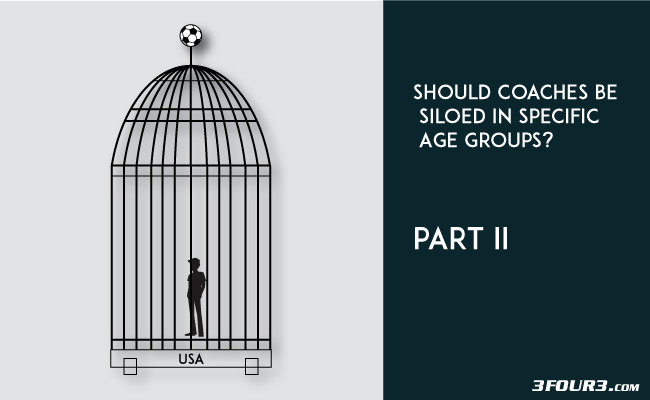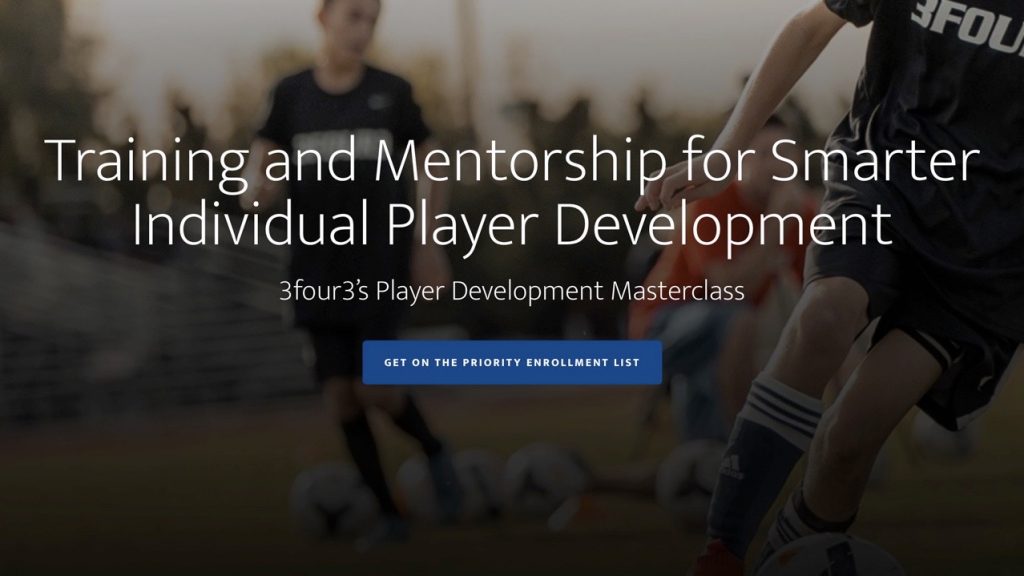
An Organizational Perspective
Looking at a club perspective there’s this sense that efficiencies are introduced, that it’s just simpler to have a conventional conveyor belt style organization.
So, much like traditional school teachers don’t really continue with their classes for multiple years, and assembly line workers from days past would stay in their respective parts of the process, so too should coaches in the club’s player pipeline.
But again, this can make sense if there’s a clearly designed and optimized end product in mind. What is the end product?
To further the metaphor, teachers and line workers are trained, specialized, and hence mostly adept at just being a specific cog in the large machine. For instance, does it make sense to assign a 6th grade science teacher to lead a group of graduate students in quantum mechanics?
Of course I’m using something extreme and not perfectly analogous, but the point is clear. That is, the skills required to coach U10 vs U14 vs U18 vs pro are different (not to mention the different levels within each). So the argument goes, silo the coaches to “where they belong”.
I repeat, there’s a rationale and merit to that. I certainly know many coaches that do well with young or lower level players, but would get chewed up and spit out if they jumped into coaching decent level U16s. I also know a lot of coaches who are comfortable just cruising with what they’re used to. These are cases where a policy of siloing coaches can be given some credence. But stopping there, and not looking into different scenarios is irresponsible.
Let’s dig deeper.
Impact to Coaches
One consequence of placing coaches in age-group silos is this:
It keeps them from developing as coaches – a key component of which is accruing experience at higher levels with higher speeds of play.
Without experiencing the higher levels, one’s grasp of what’s required there is compromised, and thus so is one’s understanding of what needs to be done at lower levels.
If a coach were to continue with the same team, the skills that can be acquired are:
- Training and managing higher speeds of play
- Managing a further matured player and team psychology
- Expanding your coaching narrative + learning longer term management (i.e. how to keep your players engaged over a long tenure – next level leadership)
- A holistic, first person, view of player and team development lifecycle(s)
Interestingly, the converse also holds.
That is, if a coach is assigned only to the high levels with high speeds of play – depending on circumstances – they’re in an environment where the margins for error (in every respect) may be too high for them to experiment and better hone their craft. It’s akin to not learning or mastering fundamentals before jumping into the deep end.
Further Impacts
If a coach is not allowed to continue with the same team:
- coach can’t build a top-level reputation in the club by building his/her team into one of its flagship teams
- coach can’t build a state/regional reputation by building his/her team into a powerhouse
- coach can’t build loyalty of families (e.g. If the coach had to or wanted to move to another club, the probability that the players will follow drops, and so the club is able to retain that team and revenue.)
Coaches who are ultra-ambitious (e.g. develop pros, or work their way to coaching pros), can’t fulfill that ambition.
First off, if you want to develop pros you have to be working with top level talent. And if you are indefinitely stuck coaching a team whose players are bottom 90 percentile, and aren’t allowed to build that team over years, make a local & regional name for yourself, you are going nowhere.
If you are a talented coach, or want to develop your talent, you are also going nowhere.
The result? Entrenched coaches – no matter how poor or mediocre – remain entrusted with the club and best teams/player pools. Of course it’s not just entrenched coaches that remain unchallenged, it’s all the power positions in the club that remain relatively unquestioned.
So, what’s an ambitious coach to do under these conditions?
Politics
If they want to climb the hierarchy, they are forced to divert focus to politics. In general, that means complying with status quo (which by the way, we all know is not getting it done for American soccer). Actually, not only does one have to comply, but one must actively befriend, endorse, and brown nose the club’s DOCs, Tech Directors, preferred coaches, board members and executives (most of which have no expertise in the game). And do the same with those outside their club.
So you see, the incentives for coaches – who want or have made this their profession – are all wrong.
Yes, politics are inescapable. But relative to other professions, the level of meritocracy is abysmal. There is little “get really good at your craft, and you’ll move up the hierarchy”. The American soccer ecosystem heavily favors those who befriend shot callers, rather than those who are great at their craft.
Do you think that effects the state of American soccer at scale?
Keep Going
All this is not to say we should just quit.
Quite the contrary, I hope ambitious coaches keep pushing and finding ways to overcome institutional barriers. The point here is to continue exposing the realities of the American soccer landscape. That way everyone goes into their pursuits with eyes wide open.
Keep building!

First off, I greatly respect the concept and agree about the limitations placed on siloed coaches. But I also had a reaction based on the fact that success can be achieved in many different ways. Some people are successful based on their ability, some on who they know, some on being in the right time/place, and some based on effort. It is the area of effort that I would imply can make a difference to an ambitious coach being stifled by the institutional barriers we know exist today.
I feel that both you and Brian offer an example of that. I choose to coach soccer at a level that I feel does not exist here in Maine because of limitations due to lack of access to premier level players, poor availability of coaching positions, lack of knowledge, etc… BUT I choose to seek and work on improving myself as a coach.
I was excited to get involved in 3four3, I listen to podcasts, I look forward to attending the summit, I coach at many levels from u9 to HS in my community. I feel that both you and Brian have worked extremely hard to improve your successful product and in the end, I do not think the institution can hold that down. Call me naive – but I choose to think I can and will make a change despite the barriers that exist here, it is what drives me.
I love it, Walter!
Having grit is key.
And I believe the more we all understand what we’re dealing with, the better we can navigate and allocate our energies.
I know you can make a change.
See you this summer!
I think you nailed it! why do we waste time and effort on a closed system at every level of the pyramid?
Perhaps a way to support meritocracy is to also view a club as developing coaches, not just players. The goal is to move coaches up the ladder as they improve. For example: the U8 coach is the U10 assistant coach.
A club should be looking to feed the best players to the best teams within the club, and as players age the lower-quality players fall by the wayside, so a U10 team isn’t going to stay together as they move up anyway.
Coaches should be evaluated on quantitative measurements of player development, and those who improve the mein of the players on their team as they graduate to the next level should be rewarded with advancement.
On another note: a problem with the coaches from the top levels coaching U10 and under is the skills and drills are different. U8 players don’t have the ability to maintain focus on a drill when they’re standing in lines and require less cardio drills, for example. I’ve seen college coaches trying to run the same practice for U7s as they do for college, and it’s not pretty.
This is a very interesting post and hits the nail on the head. I have done a 12 year apprenticeship (although my apprenticeship will never truly be over) learning the different parts of the game, ranging from U4 up to adults, recreational to future and ex-pro. Each has provided me a different challenge but over time it’s important to focus on what you are good at to the greatest extent possible. I now regard myself as a U14-U18 coach, although lack of strength in depth of coaches here in Canada means I now work with multiple age groups again, an issue Gary rightly highlights. The grounding I got over the years has helped me focus on my approach and have an understanding of the flawed techniques that make the more tactical / group work break down.
I wouldn’t change that for the world but it would be nice to see some progression and dedicate myself to the highest end of the game my abilities allow me to work at. Sadly, I’m not a full time coach or an ex-pro. I do not have a coaching licence and I’m not particularly in with the in crowd so my ability to progress here is extremely limited. I’m not particularly marketable to uneducated parents without these things. This isn’t a whine. I have a full-time job I’m happy with and I’m not looking to switch. But it is a serious issue for those who actually want to make a career in the game and make a positive difference in soccer development.
Well done Gary for highlighting the issue with North American soccer in such a succinct way.
I have seen how hard it is for a u14 player who has never been trained under the 3four3 curriculum. We put prospective players on a trial period and assess their ability to adapt. At that age it’s harder to adapt than if they were U9, but some manage to overcome years of bad (101 drills to play like Barca in 10 weeks) coaching.
I think the same applies for finding coaches. I am looking to start a new club and the problem is I can’t find suitable coaches. Some are just set in their ways and unable to take new direction and adapt to the 3four3 curriculum.
For this reason I am more open to bringing on coaches with little to no experience because they are blank slates and open to new ideas. I plan on starting them out with the younger ages where they can follow the team up through u18. Like this article mentioned, doing this would give them a chance to also develop as coaches.